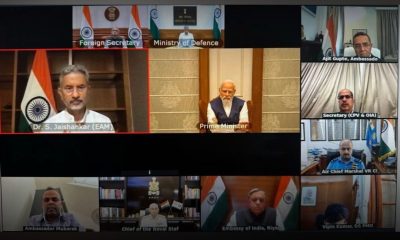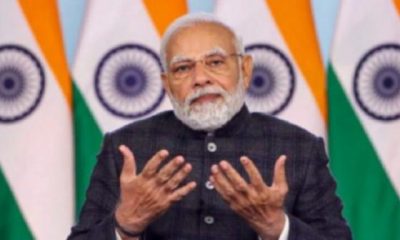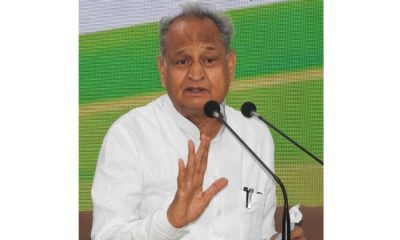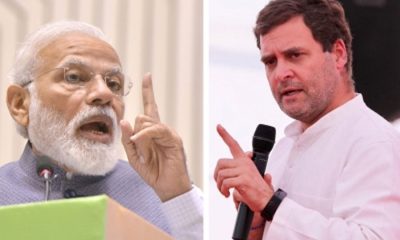National News
PM Modi inaugurates Amrita Hospital in Faridabad
Prime Minister Narendra Modi on Wednesday inaugurated 2,600-bed Amrita Hospital in the presence of spiritual leader Sri Mata Amritanandamayi Devi (Amma) in Faridabad.
With 2,600-beds, 534 of which are ICU, the facility will be one of the largest hospitals in the country. The Prime Minister formally inaugurated the hospital by unveiling a plaque marking the momentous occasion.
Speaking on the occasion of inauguration, the Prime Minister stated that as the country is entering the Amrit Kaal and collective aspirations and resolutions are taking shape, it is fitting that it is getting the nectar of blessings of Sri Mata Amritanandamayi. The hospital, he said, is a blend of modernity and spirituality and will become a medium of accessible and affordable treatment for needy patients.
“Amma is the embodiment of love, compassion, service and sacrifice. She is the carrier of India’s spiritual tradition”, he said.
Dwelling on the great tradition of service and medicine of the country, PM Modi said: “India is a nation where treatment is a service, wellness is a charity. Where health and spirituality, both are related to each other. We have medical science as a Veda. We have also given the name of Ayurveda to our medical science.”
He further added that this system of discharging the responsibilities related to education and medicine by the religious and social institutions is in a way the PPP model of old times. “It is called Public-Private Partnership but I also see it as ‘Paraspar Prayas’ (mutual effort)”, the PM said.
Recalling his address to the nation from the ramparts of the Red Fort, the Prime Minister said that he has placed a vision of the five vows of Amrit Kaal in front of the country and one of these five vows (Pran) is the complete renunciation of the mentality of slavery. He remarked that it is also being discussed a lot in the country at this time.
The Prime Minister said: “When we give up this mindset, the direction of our actions also changes.” This change, he continued, is visible in the healthcare system of the country as there is growing faith in the traditional knowledge of the country. Yoga has global acceptance today and the world will celebrate International Millet Year next year,” added PM Modi.
In her address to the people, Amma said: “Illness creates a state of desperate unhappiness. So, more than anyone, it is those suffering from illness who need our patient and loving care. Hospitals are their sole refuge, shelter, and sanctuary. As far as the patient is concerned, the doctor is God’s visible form because they are the ones who are able to give the patients some relief when they are in pain. Due to this, all those serving at the hospitals “be it the doctors, nurses, or other employees” should always have a heartfelt smile on their lips.
“Never waste any opportunity to serve. The entire world looks up to those who have the heart to do selfless service. We should not leave Mother Earth with scars. On the contrary, we should leave Mother Earth with flowers bedecked in her hair,” said Amma while concluding her speech.
The hospital is to be equipped with 81 speciality departments, the highest in India, along with 64 state-of-the-art Operation Theatres and 10 bunkers for precision-medicine oncology, the first in India. Moreover, there will be a 150-seat, fully residential MBBS programme, a Nursing College, and a College for Allied Health Sciences.
Spread across 130 acres, the hospital campus is the largest green-building healthcare project in India, with a minimal carbon footprint and zero wastewater discharge. It will eventually be solar-powered. The total built-up area is more than 75 lakh sq. ft, including 36 lakh square sq. ft. of hospital buildings.
Crime
NIA files charge sheet against 2 in Vizianagaram terror conspiracy case
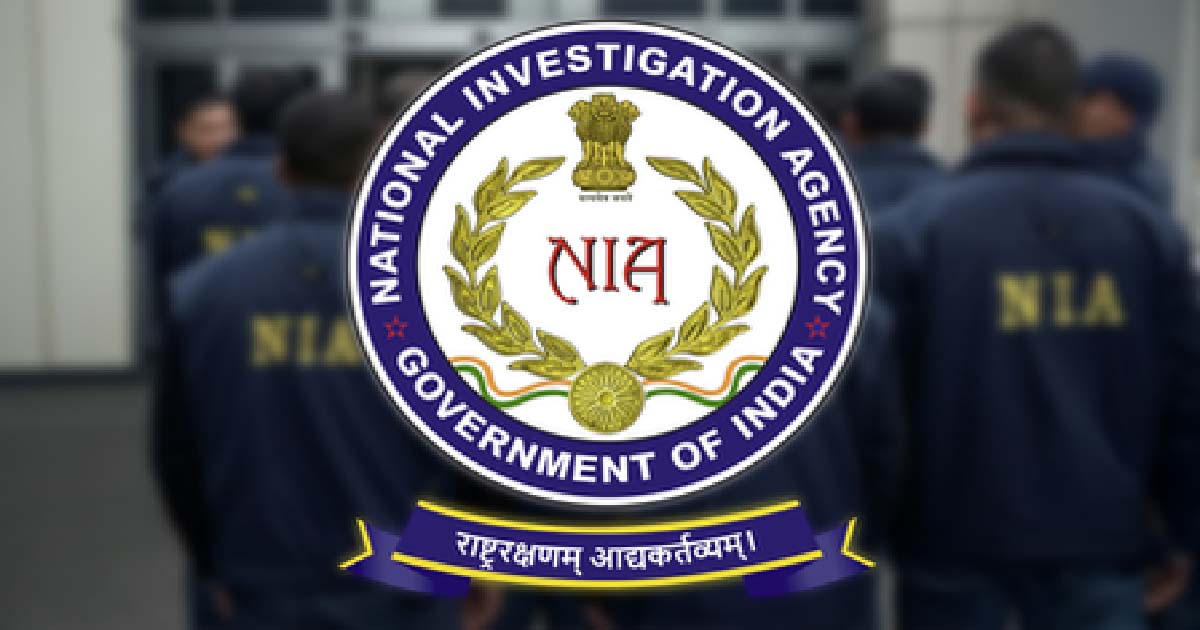
New Delhi, Nov 11: The National Investigation Agency (NIA) has filed a chargesheet against two accused in an Andhra Pradesh and Telangana terror conspiracy case, an official said on Tuesday.
The two accused, identified as Siraz Ur Rahiman of Vizianagaram (Andhra Pradesh) and Syed Sameer of Hyderabad (Telangana), were arrested by the Andhra Pradesh Police on May 16 and May 17, 2025, respectively.
The chargesheet, filed against them before the NIA Special Court, Visakhapatnam, names them for their involvement in radicalising and preparing gullible youth across India through social media platforms to carry out terrorist attacks at various places in the states of Andhra Pradesh and Telangana and across the country.
Siraz Ur Rahiman and Syed Sameer have been charged under various sections of the BNS, Explosive Substances Act, and Unlawful Activities (Prevention) Act.
The NIA, which took over the case from Andhra Pradesh Police, collected sufficient evidence establishing that the accused were inspired by ISIS ideology and were actively involved in spreading radical content through various social media groups and channels, targeting hundreds of gullible youths across India with the intent to incite them towards violent jihad and anti-national activities.
The NIA investigations revealed that the accused had created several social media groups on platforms such as Instagram and Signal, which were used to promote unlawful activities threatening the unity, integrity, security and communal harmony of the country.
The NIA continues to investigate the conspiracy to spread extremist propaganda and promote radicalisation, said a statement.
In a separate development, two more accused have been sentenced to Simple Imprisonment (SI) in the Pakistan-linked Visakhapatnam Navy espionage case by a Special Court of the National Investigation Agency (NIA), an official said on Tuesday.
The NIA Special Court at Visakhapatnam (Andhra Pradesh) has sentenced Kalavalapalli Konda Babu of Visakhapatnam District (Andhra Pradesh) and Aviansh Somal of Kangra District (Himachal Pradesh) to 5 years and 10 months of SI under each of sections 18 of UA(P) Act and section 3 of the Official Secrets Act.
The court has also imposed a fine of Rs 5,000 each, and in the event of default of payment, the accused persons will have to undergo an additional one-year SI in the case, said an NIA statement.
National News
Mumbai: Abu Azmi Slams NDA For ‘100% Security Failure’, Supriya Sule Seeks Home Ministry Report On Delhi Red Fort Blast
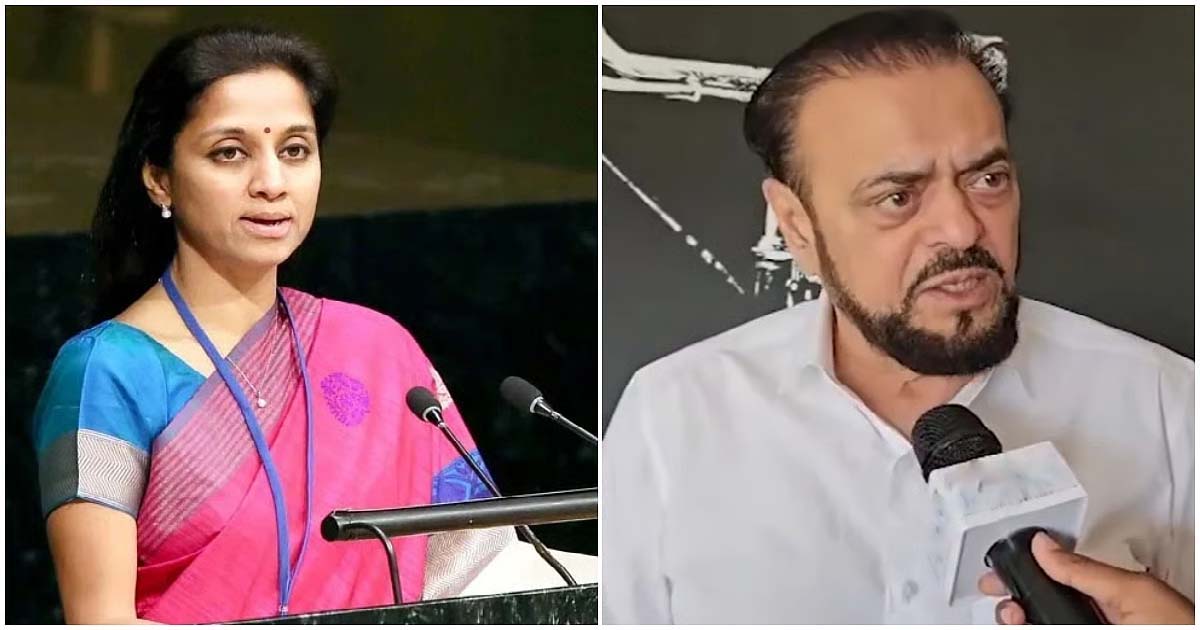
Mumbai: Reacting sharply to the recent blast near Delhi’s Red Fort Metro Station, Samajwadi Party’s Maharashtra President Abu Asim Azmi criticised the NDA government, calling the incident a “total failure of national security.”
Azmi said, “If a blast can occur in Delhi, where the Prime Minister and President reside and where the entire government operates, it reflects a 100% failure of the ruling government. Such an explosion in the heart of the capital exposes the cracks in our security system.”
Calling the incident “tragic and unacceptable,” Azmi extended condolences to the families of the victims and urged the authorities to act swiftly. “Those responsible for the blast should be investigated and sentenced to death within six months,” he added, demanding strong action and accountability from the Centre.
Meanwhile, NCP (SP) MP Supriya Sule expressed solidarity with the government, stating that matters of national security transcend political differences. “Whenever it’s a matter of national security, regardless of which government is in power, we always stand with the government,” Sule said.
She emphasised the need for transparency and a thorough probe, urging the Union Home Minister to inform the nation about what exactly transpired. “Since the Parliament session will begin soon, we will demand a detailed discussion on whether this was an intelligence failure or not,” she said.
Sule also appealed for patience until the Ministry of Home Affairs provides a detailed response. “Until the Home Ministry gives a full explanation, I believe we should wait and see what the government’s reply is,” she stated.
The blast, which took place in a high-security zone near Red Fort, has triggered outrage and concern over lapses in security preparedness in the national capital. Political parties have called for a full investigation into the cause and motive behind the explosion.
National News
BMC Elections 2025: Govt School Students Draw Reservation Lottery, 50% Wards Reserved For Women – Full List Inside
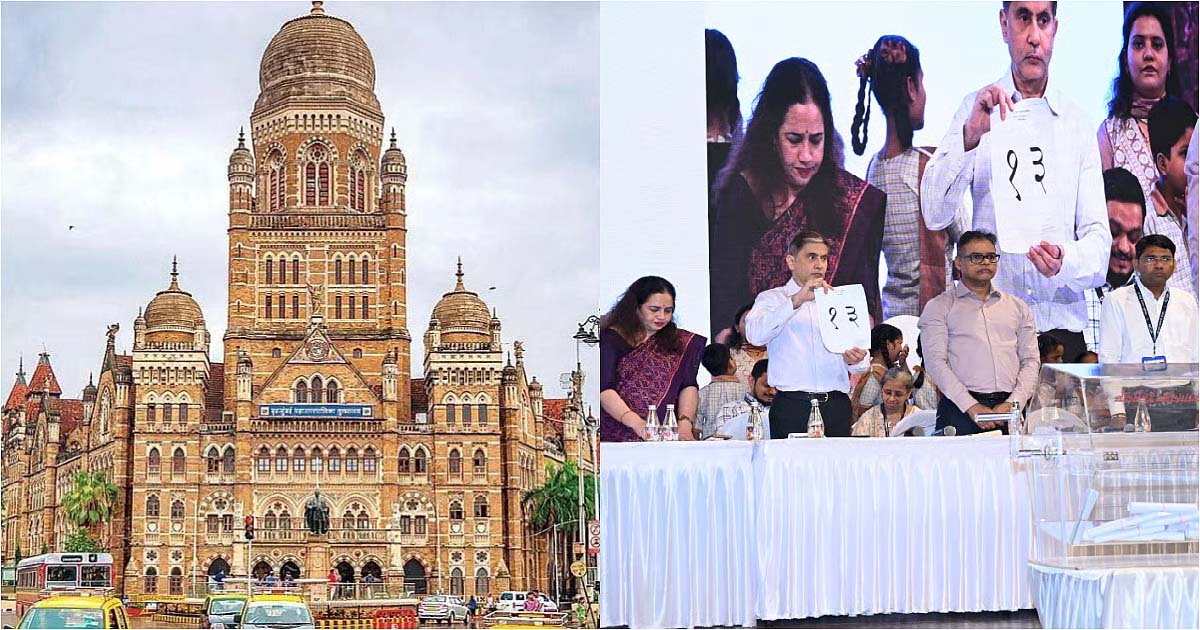
Mumbai: The lottery for reservation of wards for Scheduled Castes (SC), Scheduled Tribes (ST), Other Backward Classes, Backward Classes of Citizens (OBC) and Women, for the upcoming BMC elections was drawn on Tuesday.
The draw has decided the fate of hundreds of aspirants and shaping the poll campaign for all political parties. Mumbai has total 227 electoral wards, of which 50% are reserved for women candidates including SC, ST, OBC and General.
A total of 15 wards are reserved for SC, out of which 8 wards are reserved for SC women candidates. While two wards are reserved for ST, out of one is reservation for ST woman candidate. Total 61 wards in Mumbai are reserved for OBCs, including 31 women OBC candidates. While 149 wards are reserved for general category candidates, including 74 women candidates from general category.
For the upcoming BMC elections, the wards reserved for ST, including the women candidates are 53 and 121.
The wards reserved for SC candidates, including the women are 23, 93, 151, 186, 143, 152, 155, 147, 189, 118, 183, 215, 141, 133 and 140.
1, 6, 11, 12, 13, 18, 19, 27, 32, 33, 46, 49, 52, 72, 80, 82, 100, 105, 108, 117, 128, 129, 150, 153, 158, 167, 170, 176, 191, 198, 216, 4, 10, 41, 45, 50, 63, 69, 70, 76, 85, 87, 91, 95, 111, 113, 130, 135, 136, 137, 138, 171, 182, 187, 193, 195, 208, 219, 222, 223 and 226.
The draw was drawn by the hands of school children, in presence of BMC Commissioner Bhushan Gagrani and other officials from BMC elections department. “This is the first election under the new reservation rotation framework announced by the state government and as instructed by the state election commission,” Gagrani said before starting the lottery procedures.
On October 9, the UDD had issued BMC- Manner of Allotment and Rotation of Reservation of Seats of Councillors in Wards) Rules, 2025. As per the fresh rules, the wards with the highest population of SC, ST, OBC and Women will be prioritised for reservation.
The draft will be published on November 14, after which citizens’ suggestions/objections will be called.
-

 Crime3 years ago
Crime3 years agoClass 10 student jumps to death in Jaipur
-

 Maharashtra1 year ago
Maharashtra1 year agoMumbai Local Train Update: Central Railway’s New Timetable Comes Into Effect; Check Full List Of Revised Timings & Stations
-

 Maharashtra1 year ago
Maharashtra1 year agoMumbai To Go Toll-Free Tonight! Maharashtra Govt Announces Complete Toll Waiver For Light Motor Vehicles At All 5 Entry Points Of City
-

 Maharashtra1 year ago
Maharashtra1 year agoFalse photo of Imtiaz Jaleel’s rally, exposing the fooling conspiracy
-

 National News1 year ago
National News1 year agoMinistry of Railways rolls out Special Drive 4.0 with focus on digitisation, cleanliness, inclusiveness and grievance redressal
-

 Maharashtra12 months ago
Maharashtra12 months agoMaharashtra Elections 2024: Mumbai Metro & BEST Services Extended Till Midnight On Voting Day
-

 National News1 year ago
National News1 year agoJ&K: 4 Jawans Killed, 28 Injured After Bus Carrying BSF Personnel For Poll Duty Falls Into Gorge In Budgam; Terrifying Visuals Surface
-

 Crime1 year ago
Crime1 year agoBaba Siddique Murder: Mumbai Police Unable To Get Lawrence Bishnoi Custody Due To Home Ministry Order, Says Report



